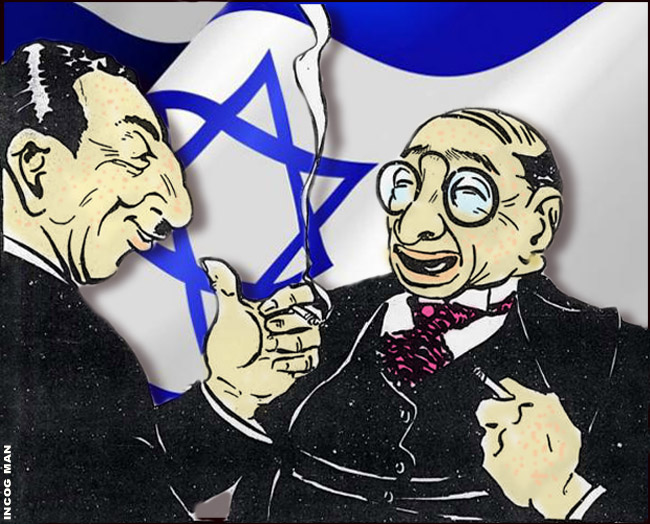Answering the American Studies Association
Tanstaffl
Age of Treason
January 3, 2014
 ASA Members Vote To Endorse Academic Boycott of Israel, American Studies Association, 16 December 2013.
ASA Members Vote To Endorse Academic Boycott of Israel, American Studies Association, 16 December 2013.
This statement, and especially the Endorsements attached below it, provide a good example of the jewish narrative blowing back on jews. The swift and explosive response from jews outside the ASA illustrates, yet again, that jews aren’t “white” in any meaningful political sense and their ethnostate isn’t subject to the usual standards by which “white” states are judged.
The divisively unanswerable questions of what it means to be ‘pro-Israel’, Max Fisher, 17 December 2013:
On Monday night, the heads of two major pro-Israel organizations and the editors of two publications associated with support for Israel gathered for a relatively routine event: a panel discussion at the 92nd Street Y, in New York, on “what it means to be pro-Israel.” A few hours earlier, members of the American Studies Association, an association of some 5,000 American studies college professors, had voted 2 to 1 to boycott Israeli universities. Shortly after the panel moderator and editor-in-chief of the Jewish Daily Forward, Jane Eisner, raised the issue, the panel broke up in a relatively spectacular walk-off.
In debates about Israel, disagreements that might seem minor on the surface – the “tyranny of small differences,” as one Israel-watcher put it to me – are often something much graver. If you know what to watch for, you can observe somber, serious people like these four panelists talk around underlying issues so sensitive they are rarely addressed or even acknowledged. Issues that are almost always below the surface, but too deep to come out except in moments of the most heated candor, often surprising even the people naming them.
These are questions so difficult, and that cut so close to the core of what it means to be an American supporter of Israel, that even scholars or professionals with decades invested in Israeli issues will hesitate to touch them. But you can hear them, if only hinted at, in arguments like Monday evening’s. Is it good or bad for Israel that more American Jews are questioning Israeli policies? At what point, if ever, should one’s support for Israel be limited by the needs of non-Israelis touched by the conflict? Is a Zionist’s responsibility to guard Israel’s survival, to guard Israel’s interests or merely to concern oneself dispassionately with the issues facing the country?
Some of these questions are simply unanswerable. Some are trick questions. Some are highly taboo; the question about competing interests can easily echo accusations, made by the most anti-Semitic movements in history, that Jews harbor “dual loyalties” and cannot be trusted. But many are just extremely difficult, touching on issues of identity, politics and personal responsibility. They cause conflict both because no one can agree on the answers, or often even the terms of the questions themselves, and because everyone ends up judging one another according to their own personal and widely varying standards.
What’s best for the jews? This is the central question around which jewish arguments about politics, identity and everything else revolve. To a jew this question is “unanswerable” only in the sense that they never stop asking it. By exaggerating their disagreements on answers jews downplay their agreement on the question.
In asking this question jews show no fear of tricks or taboos. What they fear are the wholly different questions which inevitably form in the minds of non-jews. Who are these jews? What are they doing? Why should anyone tolerate the conflict and harm they cause? These questions, and the “anti-semitic movements” which coallesce in response, have historically been instigated by the words and deeds of the jews themselves, by jewish parasitism, by jews infiltrating, manipulating and exploiting their host society.
In the case at hand the jews are more and more openly directing the resources of the United States toward Israel. They anticipate a hostile reaction because one is justified. The existence of Israel, their fruiting body, only highlights jewish parasitism. It inspires even nominally “liberal” jews to fret most illiberally over their particularist identity and interests, even when those interests are being served so clearly at the expense of others. It inspires even nominally “conservative” jews, like John Podhoretz, to tantrum at domestic tribemates on behalf of foreign tribemates.
How do they answer the ASA? By orchestrating political and academic boycotts, of course. Jews in government are moving to cut off government funds to ASA supporters and jews in universities are directing them to cut off support for ASA. No “dual loyalty” here. These jews in positions of power demonstrate that they see themselves as jews first, and see the institutions over which they have some measure of power as vehicles for advancing the interests of jews. One institution has vexed them, so they are using their influence over others to exact punishment.
Jews know they don’t face any substantial, organized opposition. The only real difficulty they have is in communicating about their conspiracy. Their problem is more cryptological than ideological. How to discuss and advance jewish interests while suppressing any “anti-semitic movement”? Their answer, as always, is to do both, because they are in essence the same.
